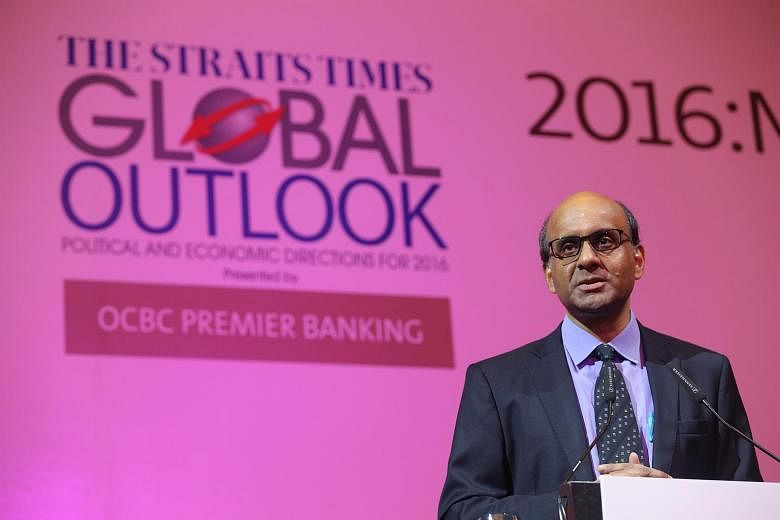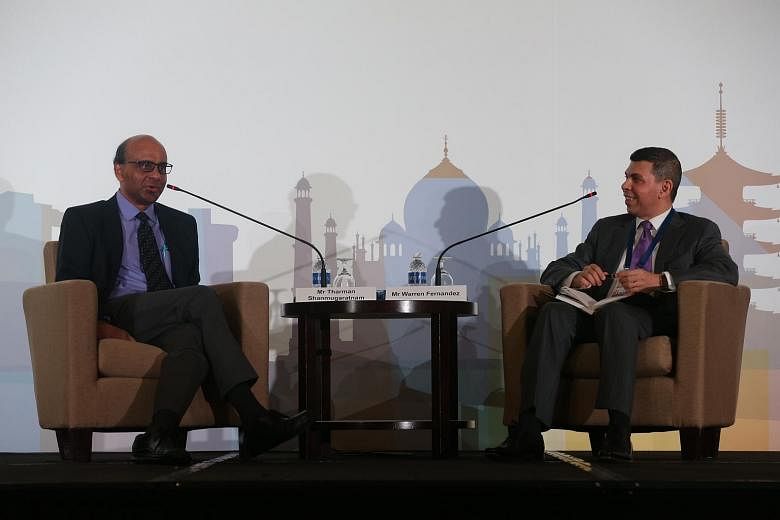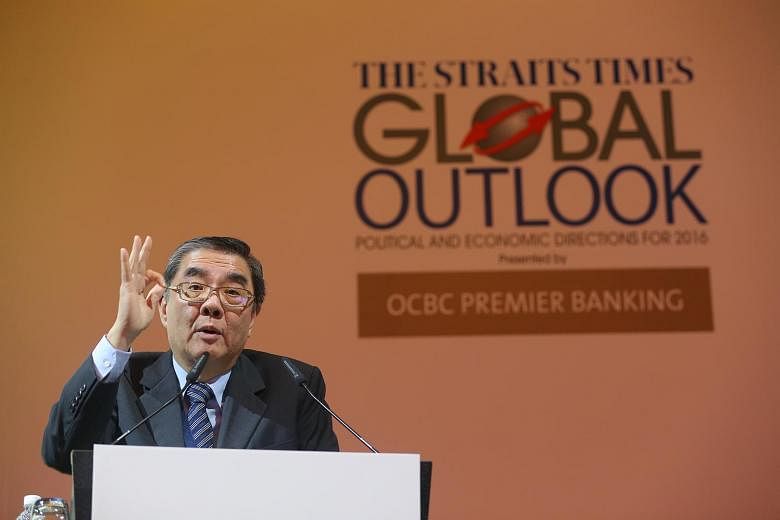SINGAPORE - Economies around the world, both emerging and developed, are undergoing major structural shifts that will mean slower economic and trade growth, said Deputy Prime Minister Tharman Shanmugaratnam on Friday (Nov 20).
The keys to growing amid a slowing world, he added, are productivity and innovation.
In his keynote speech at The Straits Times Global Outlook Forum, Mr Tharman, who is also Coordinating Minister for Economic and Social Policies, said the world is entering a new phase in global affairs, marked by slower growth overall.
This is because of changing demographics in a whole range of countries and slower growth in global trade, especially due to the evolution of the Chinese economy, which is aiming to become less dependent on external trade and more reliant on domestic consumption.
At the same time, the world will also be marked by continuing tensions for a long time to come, coming out of sectarian conflicts which are now no longer confined to a few countries in the Middle East but are globalised.
"Part of the complexity of the world is due to the fact that we are seeing a confluence of cyclical and structural factors," Mr Tharman noted.
The United States, for example, is still grappling with the cyclical challenge of returning to a situation of normal growth while being faced with long-term structural issues, such as a polarisation of the workforce. Job growth has been stagnating, yet there is a severe shortage of skills that are in high demand.
"Whether nursing specialists or skilled technicians, employers can't find the right skills. This is a feature of the US and other developed economies. That's a structural phenomenon."
In China, the cyclical problem of unwinding excessive corporate debt that had built up over the last several years is being compounded by the structural shift towards a new normal, the confluence of which will lead to slower growth in the economy over the medium term and have an impact on many markets around the world, he said.
"China has embarked on a shift in the nature of its economy, both in terms of pace and composition. It is moving away from an investment-driven growth strategy to one driven by consumption and services," he noted.
"But what has been less noticed and is also a very important structural shift is taking place in China's manufacturing sector itself. Remember, China is still a manufacturing powerhouse. It has not lost but gained market share in the past few years. It is onshoring more of the production."
That is, China used to contribute to certain parts of the supply chain but is now producing more of the input itself, thus lengthening its value chain.
"That shift has a quite dramatic effect around the world - for Korea, Taiwan, Japan, Singapore. Because what we used to contribute is now being done in China itself."
But even against this big picture of slowing growth, there are opportunities too, Mr Tharman added.
These are "opportunities that will come to players who are innovative, individuals who are skilled and teams that bring the right skills together", he said.
He noted that Singapore firms are already tapping opportunities around the world and are doing well in foreign lands from Latin America to Russia.
But to continue doing well, Singapore will have to become more innovative and productive, he said.
This is where SkillsFuture comes in. The programme, which was unveiled in the Government budget earlier this year, will help raise worker skills "across the ladder for all types of jobs", Mr Tharman said.
"We have to equip people with the skills needed to work in a technology-enriched world so that jobs get better."
At the same time, the Government aims to work with companies to ensure that innovation and productivity get diffused throughout the whole economy.
"We have to work cluster by cluster to get innovation chains that combine large firms with small firms, foreign firms with local firms and have collective innovation in each supply chain, industry by industry."
There also has to be a cultural shift, Mr Tharman said.
Innovation requires deep specialisation and mastery in a certain set of skills, and Singapore has to build up a culture of pride in mastery, while taking pride in individuals who embark on building their own companies and brands.
A change in the culture of Singapore's education is also needed - parents should be "less obsessed" with the grades that their children obtain in school, and focus more on giving their kids diverse experiences and interactions with people of different backgrounds.
Mr Tharman noted that there are already many technological innovations taking place in Singapore today, from a recent lecture at the Nanyang Technological University which took place via holograph, to a new taxi booking app called Karhoo.
These are promising signs that have to be nurtured, he said.
"Innovation is taking place every day. Something is bubbling up in Singapore, but we have to give it a push."









